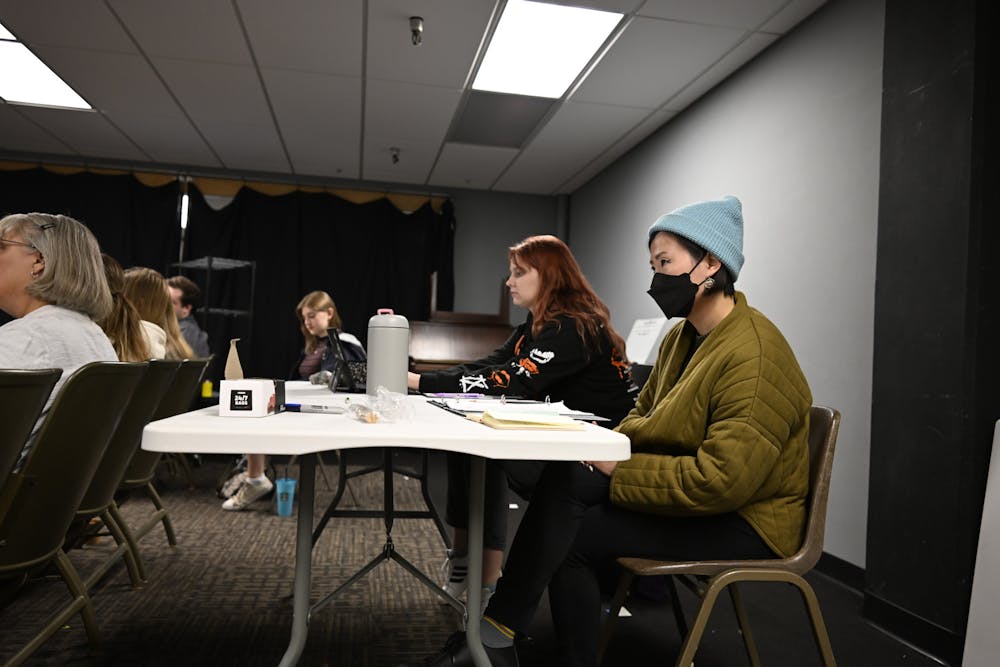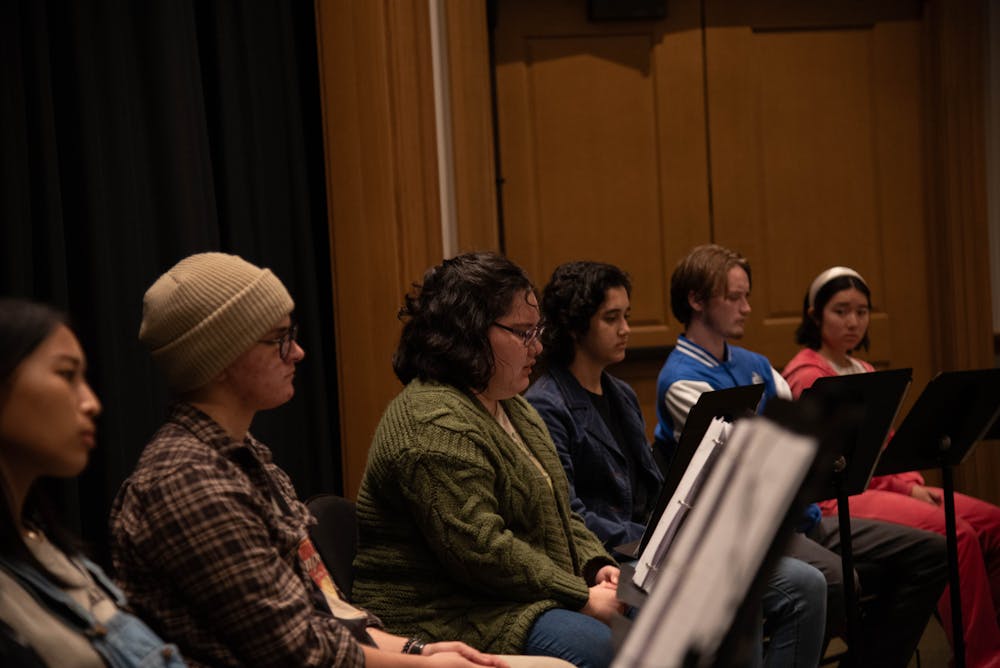Content warning: This article discusses themes of sexual assault and mental health.
UP theater’s first play of the season, “You Can See All the Stars,” begins with a startling question: what happened the night first-year college student Ana returns to her dorm distressed and missing a shoe?
On Oct. 2 at 7:30 p.m., the theater department debuted “You Can See All the Stars” in the Brian Doyle Auditorium. Directed by Barbie Wu, the stage-read play follows Ana in the aftermath of her rape — ultimately addressing the prevalence of gender-based violence on college campuses. At the beginning of each performance, the theater department distributed flyers with information about on-campus resources like the Wellness Center to help audience members process the play’s themes and questions after leaving the auditorium.

Director Barbie Wu on the right during a rehearsal. Photo courtesy Emily Hogan by Rowan Lowery
After the play initially poses the question of what happened to Ana, Ana tells her friend, Kevin, about the assault in an off-stage conversation. At this point in the play, Ana only alludes to a traumatic event, not yet calling it rape. Like Ana and Kevin, the audience doesn’t yet have a complete picture of Ana’s experience.
The inclusion of off-screen dialogue shows Ana’s trauma doesn’t have to be displayed onstage for audience members to understand what has happened to her. Seeing the mental repercussions of the event is enough to understand the assault is emotionally scarring for Ana. Having the conversation between Ana and Kevin happen off-stage is also an effective way to shift the narrative of Ana’s story from what happened to her to how she moves forward from the assault.
The scene shifts back to the stage when Kevin urges Ana to tell the police her story. Ana refuses, but she agrees to tell the campus authorities what happened to her.
Afterward, Ana speaks directly to the audience, sharing her story with her school. Senior theater major Mollie Goldberg, who plays Ana, looks into the crowd when delivering her lines. The breaking of the fourth wall is surprising, yet this technique works given the personal nature of discussing sexual assault. For a moment, the audience became yet another character Ana was telling her story to.
As the play moves forward, Ana becomes a social outcast. Her peers and classmates shun her for speaking out and care more about Ana’s assaulter, the school’s quarterback, Jesse, being benched than Ana’s wellbeing. Ana’s struggle to gain support from others was especially frustrating given the reality of how difficult it is for many victims to speak out about their experiences with sexual violence because of shame or a fear of being judged.
The audience soon became tense after Ana’s classmate Kim refuses to acknowledge Ana’s assault. Through Goldberg’s evocative delivery, we feel the betrayal and loneliness Ana has been experiencing since the start of the play.
Even though Kim is an unlikeable character, when she addresses the audience and reveals the betrayal she ultimately feels from Jesse’s actions, my anger towards her transforms into understanding. Characters like Kim feel real because of their shifting perspectives — there are no one-dimensional villains.

Senior theater major Mollie Goldberg, who plays Ana, during a rehearsal. Photo courtesy Emily Hogan by Rowan Lowery
While not a detailed scene, the play also depicts the legal side of Ana’s search for justice. When the District Attorney drops Ana’s case for lack of evidence, I am left heartbroken as Ana’s hope for judicial justice is taken away. Goldberg’s emotional delivery conveyed how devastating this legal rejection is for Ana. I could hear the actor’s voice tremble and see her hands shake from my seat.
The story peaks when Ana, frustrated and tired with the lack of support from those around her, stands near the edge of her dorm’s roof. Though never saying it aloud, the play makes it clear what might happen if nobody intervenes.
“You Can See All the Stars” is not an easy watch. The play encapsulates what many college students go through while also reiterating the importance of speaking up against sexual violence and being there for all victims, even strangers.
In the final monologue of the play, Ana admits how difficult this process has been. She says, at the end of the day, getting justice won’t change everything, especially not the emotional consequences she has and will continue to face. But at the same time, her search for justice motivates her to keep going. It gives her a reason to stay.
More information on UP’s Title IX resources can be found here. A list of confidential Title IX advocates can be found here.
Samantha Zavala is a reporter for The Beacon. She can be reached at zavala27@up.edu








